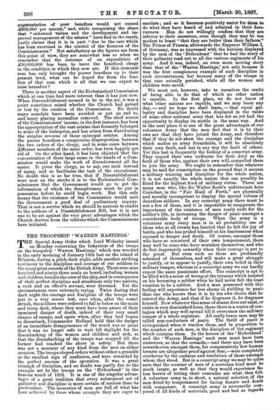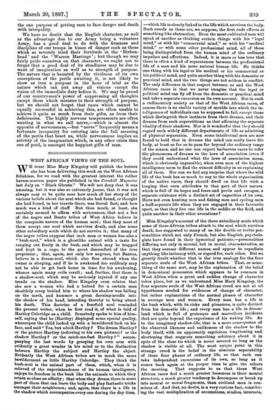THE TROOPSHIP WARREN HASTINGS.' T HE Special Army Order which Lord
Wolseley issued on Monday concerning the behaviour of the troops on the troopship Warren Hastings,' which was wrecked in the early morning of January 14th last on the island of Wunion, during a pitch-dark night, adds another striking testimony to the discipline and courage of our soldiers to the many great records of the British Army. There were nine hundred and ninety-three souls on board, including women and children, besides the crewof the ship, and in consequence of their perfect discipline and steadiness only two natives, a cook and an officer's servant, were drowned. Yet the circumstances were extremely trying. Twice during that dark night the courage and discipline of the troops were put to a very severe test, once when, after the vessel struck, the soldiers were ordered to fall in below on the main and troop deck, where they must have been aware of their imminent danger of death, indeed of their very small chance of escape, and again when, after they had begun to disembark, Commander Holland held that the danger of an immediate disappearance of the wreck was so great that it was no longer safe to wait till daylight for the disembarking of the women and children and sick, so that the disembarking of the troops was stopped till the former had reached the shore in safety. But there was not a murmur of any kind from the men on either occasion. The troops obeyed orders without either a grumble or the smallest sign of confusion, and were rewarded by the perfect success of the operation. It was a great triumph of discipline, and no doubt was partly due to the example set by the troops on the ' Birkenhead' in the famous wreck of 1852. It is one of the singular advan- tages of a great tradition that every subsequent act of gallantry and discipline is more certain of success than its predecessor. The memories of men are full of what has been achieved by those whose example they are eager to emulate ; and so it becomes positively easier for them to do what they have heard of and admired in their fore- runners. Men do not willingly confess that they are inferior to their ancestors, even though they may be too modest to boast " that they are better than their fathers." The Prince of Prussia, afterwards the Emperor William I. of Germany, was so impressed with the heroism displayed by the men of the 'Birkenhead ' that he had the story of their gallantry read. out to all the various regiments of his army. And it was, indeed, an even more moving story than that of the Warren Hastings,' not only because it was the first conspicuous example of such discipline in such circumstances, but because many of the troops in that case actually perished, while all the women and children were saved.
We must not, however, take to ourselves the credit of being able to do that of which no other nation is capable. In the first place, we do not know of what other nations are capable, and we may learn any day, — and we hope we shall learn, — that equal gal- lantry and discipline have been displayed in the ranks of some other national army that has not as yet had the opportunity to display its mettle in the same way. And in the next place it is one of the great advantages of our volunteer Army that the men feel that it is by their own act that they have joined the Army, and therefore that if they do not show the courage and the discipline which makes an army formidable, it will be absolutely their own fault, and not in any way the fault of others. Yet this last is frequently the feeling of a conscript army. They regard their own unfitness for their duty as the fault of those who, against their own will, compelled them to join the army. We ought to remember that whatever may be said for conscription on the ground that it secures a military training and discipline for the whole nation, it is not exactly the whole nation that can possibly be fitted for the highest kind of military virtue. There are many men who, like Sir Walter Scott's unfortunate hero Conachar, in the " Fair Maid of Perth," are physically and morally incompetent to display the special virtues of dauntless soldiers. In any conscript army there must be not a few of these, and it is impossible to exaggerate the importance of the existence of men really unfit for the soldier's life, in increasing the danger of panic amongst a considerable body of troops. When the army is a volunteer army every man is in all probability one of those who at all events has fancied that he felt the joy of battle, and who has prided himself on his fearlessness when exposed to danger and death. Of course, amongst those who have so conceived of their own temperament, there may well be some who have mistaken themselves, and who do feel desperately cowardly when their courage is put to the proof. But even such as these are profoundly ashamed of themselves, and will make a great struggle to justify, or to appear to justify, their own belief in their military temper, whereas in a conscript army we can hardly expect the same passionate effort. The conscript is apt to be filled with a sense of wrong at the tyranny which insisted on his becoming a soldier when he had never felt the least vocation to be a soldier. And a man possessed with this feeling will experience far less shame in yielding to panic than one who knows that it is by his own choice that he entered the Army, and that if he disgraces it, he disgraces himself. Now wherever this sense of shame does not exist, or exists in very diminished force, there there is a centre of con- tagion which may well spread till it overcomes the military temper of a whole regiment. All really brave men may be called non-conductors of panic. The thrill of panic is extinguished when it reaches them, and in proportion to the number of such men, is the discipline of the regiment which contains them. In the heroes of the Birkenhead' and the ' Warren Hastings' such men must have been numerous, so that the cowards,—and there may have been cowards even amongst them, for comparatively few human breasts are altogether proof against fear,—were completely overborne by the coolness and resolution of those amongst whom they stood. But in a conscript army we may be quite sure that the number of men of a nerveless kind must be much larger, as well as that they would experience fax less horror of letting their comrades see what they felt. A volunteer army is, in short, a natural selection of the men fitted by temperament for facing danger and death with composure. A conscript army is necessarily com- posed of all kinds of materials, good and bad as regards the one purpose of getting men to face danger and death with intrepidity.
We have no doubt that the English character, as well as the advantage due to our Army being a volunteer Army, has a good deal to do with the firmness and discipline of our troops in times of danger such as those which so severely tried their fortitude in the ' Birken- head' and the Warren Hastings ' ; but though we may fairly pride ourselves on that character, we ought not to forget that a good deal of its steadiness may be due to want of imagination as well as to strength of purpose. The nature that is haunted by the vividness of its own conceptions of the perils awaiting it, is not likely to show as iron a purpose in the hour of trial as the nature which can put away all visions except the vision of the immediate duty before it. We may be proud of our countrymen's power of suppressing all thoughts except those which minister to their strength of purpose, but we should not forget that races which cannot be equally successful in achieving this, are often unable to achieve it quite as much from their gifts, as from their deficiencies. The highly nervous temperaments are often wanting in what we call nerve,—which is almost the opposite of nervousness,—but "nerve" frequently means a fortunate incapacity for entering into the full meaning of the perils that beset us, while nervousness implies an activity of the imagination which, in any other crisis than one of peril, is amongst the happiest gifts of man.







































 Previous page
Previous page